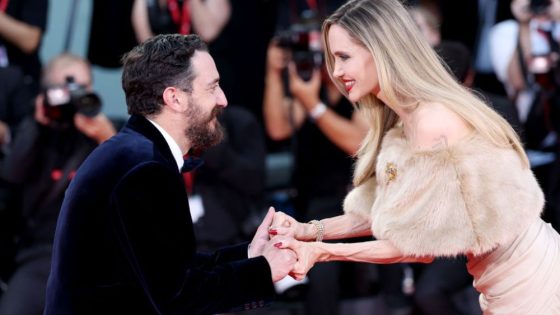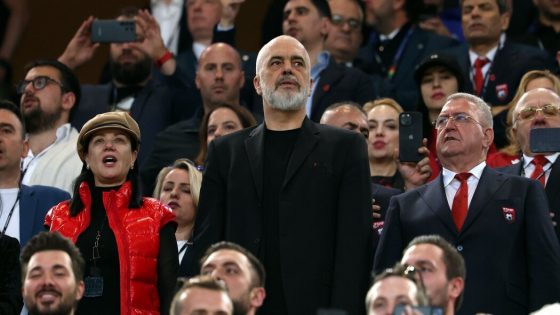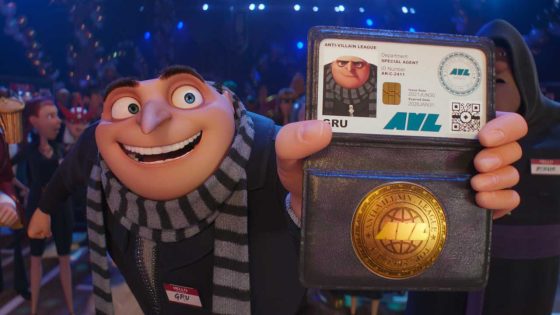Angelina Jolie received a thunderous, eight-minute standing ovation at the Venice Film Festival following the world premiere of Pablo Larraín’s “Maria.” The reception moved the Oscar-winning actress to tears and left her contemplating the legacy of Maria Callas, the opera diva she brings so thrillingly to life on screen.
“I thought about her a lot in that moment,” Jolie said during an interview at the Telluride Film Festival, where “Maria” screened last week. “It’s strange when you feel so close to this real human being. I know that applause was for her life. Often, we don’t, as artists, know if our work resonates, or we don’t expect kindness. You walk out expecting not to be supported or not to connect. But ‘Maria’ did.”
“Maria” is part of Larraín’s trilogy of iconic, often misunderstood women, one that began with “Jackie” (2016), starring Natalie Portman as Jacqueline Kennedy, and “Spencer” (2021), which featured Kristen Stewart as Princess Diana. Both actresses were nominated for Oscars for their turns, and Jolie seems likely to continue the streak given the rapturous reviews she’s earned. It helps that “Maria” is probably the strongest entry in Larraín’s series, featuring a compelling script by Oscar nominee Steven Knight (“Dirty Pretty Things”) that chronicles Callas’ final days and shows the human side of a legend. Netflix picked up the movie and is planning an awards season push.
Jolie and Larraín clearly respect, even love, one another. At one point, Jolie tries to convince Larraín to sing opera. “I haven’t heard you sing. You owe me this,” she tells her director.
“It will never happen. I am no actor,” Larraín responds with a grin.
But Jolie isn’t giving up. “I’ll get you drunk one night,” she tells him.
But that will have to wait. Right now, Larraín and Jolie are more focused on discussing what drew them to them project, the challenges of portraying an opera legend and their hopes that the film will encourage people to reassess Callas’ life and art.
How did it feel to take on a role so massive as Maria Callas?
Jolie: It’s great. You always hope to work with directors you’ve admired, and I’ve wanted to work with Pablo for a while. It is a gift to take on something like this, knowing you’re in good hands and can push yourself to the edge because they’ll catch you. Her music was daunting, but it’s good to feel scared. As an artist, being so challenged that you’re unsure if you can do it is a great feeling.
I’ve described Larrain’s previous movies, “Jackie” (2016) and “Spencer” (2021), as “horror biopics.” With “Maria,” I would say it’s a fantastical musical. Would that be accurate?
Jolie: I asked you [Larrain] if we were doing a musical. I think it’s a musical.
Larraín: I like it. Musicals in cinema are essentially modern American, and English adaptations of opera, which originated over 500 years ago as the first blend of dramatic storytelling and music. If a movie can evoke the same sensation as opera, it has the potential to make opera more accessible to those who might view it as an elitist or outdated art form. This was a goal of Maria Callas, who, like Caruso and Pavarotti, sought to bring opera out of exclusive, expensive venues and back to its roots as folk music intertwined with storytelling. If a film can open new audiences to opera, it would be a beautiful achievement, fulfilling the original intent of the art form.
There’s a scene in the movie when Callas’ sister says to her, “Close the door, little sister,” to which she responds: “I can’t. That’s how the music comes in.” Did you see the parallel and connection between what Maria says at that moment to your craft and the personal struggles you’ve faced in life?
Jolie: I suppose. I’m unsure if there’s a right way to live life, and for me, there’s no clear ‘on’ or ‘off.’ I feel a lot — sometimes too much — and my mind never seems to shut off. I express myself through my work, which has helped me navigate these emotions. In a way, I live through communication and a sense of innocence, much like she does, and I don’t know how to turn that off.
There’s a scene in the movie where Maria is playing cards with her housekeeper Bruna (Alba Rohrwacher) and her servant Ferruccio (Pierfrancesco Favino) that shows the love between the unconventional family that Maria built herself. Was that your intention?
Jolie: That was Pablo. He wanted us to improvise a card game. That was last minute, and I remember I said I didn’t understand. I was a little resistant.
Larraín: You weren’t initially keen to do it, but once you sat down, you found the best way to approach it, and it turned out to be incredibly moving. It was an improvisation, and I felt we needed a small, intimate moment within the family that wasn’t connected to anything that could go anywhere in the film. I brought up the idea, Guy [Hendrix] brought the cards, and we quickly set it up. We discussed what it could be about and what you’d say. The way you held hands with Francesco created a very beautiful moment. It captured the essence of a family in the best possible, most emotional way.
Jolie: Yes, especially those who stand by you. Obviously, for my children, too, blood is family as much as it is with those who aren’t. The connection is that you share the same heart and the same values.
How hard was it to learn opera and sing?
Jolie: It wasn’t easy. I was fortunate to have a director who truly understood and respected opera. He knew how much work was required and assembled a team around me to teach me. He made sure I had the classes I needed and gave me the space to practice. From the beginning, he understood that I needed extra time to prepare, and he always supported my transformation process. I remember a day, just before we started shooting when we were in a small room in Paris. It was the first time I would perform, and I knew he had been getting reports about my progress. And that moment on the soundstage, with the piano, was like, ‘There’s no more time.’ I had to sing in front of him out loud. I kept thinking I would be singing with Maria or some track. Pablo explained that the only way to capture it was I would have to be the only one hearing Maria.
Larrain: It isn’t easy to understand how it’s done. She trained for six months, and then you do five to seven takes in 45 minutes. She had an earpiece, and it’s the only sound you hear on set. And sometimes, there would be about 200 extras on set.
Jolie: They would be so nice to me. I would apologize in advance for not being all I can be. But then they would get behind me, and they would encourage me as I took on more challenges and emotional moments.
There’s a moment in the film when Kodi Smit-McPhee’s character says to Maria Callas, “I’ve fallen in love with you.” Did either of you fall in love with Maria during this process?
Jolie: I think that’s why I was so moved when people were moved by it in Venice. She’s this person who we know wasn’t always treated well and isn’t always understood. Having this chance will help people understand and respect her a little bit more. I felt a duty to her and her life. I love her.
Larraín: I love her, and this celebrates her life and music. Yes, her destiny was her tragedy. But there’s so much beauty there. Look at her. Look at the world she built. There’s something invisible and irrational about opera. This type of film is the best version of crafting, and we have to be invisible. So when we have the ‘diva’ doing her job, that’s how the music gets in.
This interview has been edited and condensed.
Source Agencies



